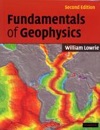
Geophysics: measuring the Earth
 Geophysics is a field of earth sciences that uses the methods of physics to investigate the physical properties of the Earth and the processes that have determined and continue to govern its evolution.
Geophysics is a field of earth sciences that uses the methods of physics to investigate the physical properties of the Earth and the processes that have determined and continue to govern its evolution. [William Lowrie Oxford University Press, 2018 - 160 p]
Geophysics.eu
 Geophysics is the application of physics to investigations of the
Earth. The study of the interior of the Earth is known as Solid Earth
Geophysics, subdivided further into Global Geophysics or alternatively
Pure Geophysics which is the study of the whole or substantial parts
of the planet and Applied Geophysics which is concerned with investigating
the Earth’s crust and near-surface to achieve a practical and,
more often than not, an economic aim.
Geophysics is the application of physics to investigations of the
Earth. The study of the interior of the Earth is known as Solid Earth
Geophysics, subdivided further into Global Geophysics or alternatively
Pure Geophysics which is the study of the whole or substantial parts
of the planet and Applied Geophysics which is concerned with investigating
the Earth’s crust and near-surface to achieve a practical and,
more often than not, an economic aim.
Applied Geophysics covers everything from experiments to determine
the thickness of the crust to studies of shallow structures for engineering
site investigations, exploring for groundwater and for minerals and
other economic resources. To try to locate narrow mine shafts or other
form of buried cavities, mapping archaeological remains, locating
buried pipes and cables and more where in general the total depth
of investigation is usually less than 100 m
 Geophysical
essentially is the measurements of the contrasts in the physical properties
of material beneath the surface of the Earth and the attempt to deduce
the nature and distribution of the materials responsible for these
observations. …. Variations in elastic moduli and density cause
seismic waves to travel at different speeds through different materials.
…. Variations in the electrical conductivity of rocks and sediments
produce varying values of apparent resistivity as the distance between
measuring probes is increased or as the position of the probes are
changed on the surface. … Density variations in the subsurface
lead to variations in gravitational acceleration at surface instrument
station and variations in magnetic susceptibilities produce measurable
differences in the magnetic field at field observations sites. H.R.
Burger et Al. Introduction to Applied Geophysics.
Geophysical
essentially is the measurements of the contrasts in the physical properties
of material beneath the surface of the Earth and the attempt to deduce
the nature and distribution of the materials responsible for these
observations. …. Variations in elastic moduli and density cause
seismic waves to travel at different speeds through different materials.
…. Variations in the electrical conductivity of rocks and sediments
produce varying values of apparent resistivity as the distance between
measuring probes is increased or as the position of the probes are
changed on the surface. … Density variations in the subsurface
lead to variations in gravitational acceleration at surface instrument
station and variations in magnetic susceptibilities produce measurable
differences in the magnetic field at field observations sites. H.R.
Burger et Al. Introduction to Applied Geophysics.
PASTE RESPONSIVE AD
Articles
